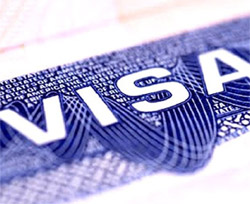|
Washington, DC – Efforts by the Obama Administration to expand opportunities for Iranian students are coming up against the reality of increasingly broad U.S. sanctions. A provision in the latest sanctions bill, signed into law this past August, would ban visas for Iranian students seeking to study a field that will prepare them “for a career in the energy sector of Iran or in nuclear science or nuclear engineering or a related field in Iran,” as determined by the Secretary of State. The broad language raises many questions about what fields would constitute a potentially problematic career path and how the U.S. government will assess Iranian student visa seekers’ future career path. As originally drafted, the provision was even more restrictive, written in such a way as to apply to all engineering students. National Iranian American Council did manage to have the engineering provision removed and strongly opposed the final bill. The new restrictions run counter to the Obama Administration’s stated goal of reaching out to young Iranians. In May 2011, Secretary Hillary Clinton responded to calls from Iranian students and Iranian Americans and announced that Iranian students would be eligible for multiple-entry visas instead of more restrictive single-entry visas. Announcing the move, Clinton said, “as long as the Iranian government continues to stifle your potential, we will stand with you. We will support your aspirations, and your rights. And we will continue to look for new ways to fuel more opportunities for real change in Iran.” But now as new restrictions are implemented regarding what fields Iranian students are allowed to study if they seek to come to the U.S., in Iran the government has imposed restrictions that limit what fields women are allowed to study domestically. Women currently make up approximately sixty percent of university students in Iran. At the same time, the Iranian government has attempted to dissuade students from studying in Western colleges and has offered scholarships and incentives for students to study at Iranian universities in the field of nuclear science. Even before the new sanctions, the implementation of the multiple-entry visa has not met all of the expectations of those who supported the policy. Broad discretion has been given to U.S. consular officials to deny the new visas to students studying fields that may be considered “sensitive” to U.S. interests. And many students applying for multiple-entry visas have reported that they are still only being granted single-entry visas. An informal survey conducted by Dr. Fredun Hojabri survey indicates that only 26% of the Iranian students who applied for multiple-entry visas actually received them. Moreover, many Iranian students currently studying in the U.S. on single-entry visas have decided not to take advantage of the new policy. To apply for the new visa, they are required to leave the U.S.–a significant risk given the uncertainties about “sensitive fields” and the possibility that, if they leave to apply for a new visa, they may not be able to return to complete their studies. Additionally, new changes to the U.S. visa application process announced by the State Department will also likely impact non-students who seek to come to the U.S. from Iran. Iranians seeking to apply for visas are required to schedule an advance appointment online and specifically requires that applicants pay the appointment fee with an international credit card. In simpler times, this might not have been an issue. But due to broad U.S. financial sanctions, Iranians are hard-pressed to find banks willing to issue international credit cards to anyone inside the country. In order to comply with proper visa procedures, applicants are essentially being required to find ways to violate the sanctions. In a letter sent today to Secretary Clinton, NIAC warned against new restrictions on Iranian students and urged for renewed efforts to ensure Iranian students and visas seekers are not punished in the standoff between the U.S. and Iran. NIAC also called for the State Department to issue clarifying guidelines for Iranian students regarding what fields of study would be affected by new and existing policies. |
|
